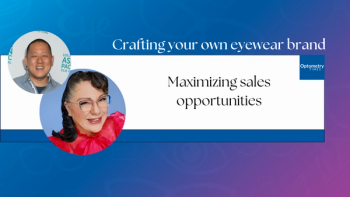
Optometrist, care for thyself
I know it is human nature to ignore our mortality. I also know running a small business like most of us do, we have our eyes on temporal problems: payroll, staff, insurance. All these little fires leave us with no time for other things, and what gets neglected most often is ourselves.
Children are remarkable. They're omnipotent, immortal, and indestructible, or so they think. I'm not certain this attitude is limited to just children; sometimes I think even as we age we believe we’re going to continue on the way we're going forever.
I know it is human nature to ignore our mortality. I also know running a small business like most of us do, we have our eyes on temporal problems: payroll, staff, insurance. All these little fires leave us with no time for other things, and what gets neglected most often is ourselves. Which is really ironic as we’re often concerned with investing in our practice, when in truth the most important asset in our practice is us!
I read an article in the New York Times detailing how doctors prepare for end-of-life differently than the general public.1 I don't want to get all morbid here, but the piece got me thinking about decisions I had not made because I've been just too dadgone busy. That's my excuse and I'm sticking to it.
As a parent, we often put the needs of our children above our own. In a similar vein, are we neglecting our own health in caring for others? Think about it for a moment: when was the last time you had a complete physical exam, with blood work and the probing in all the uncomfortable places? Let's go even further: when was the last time you, eye doctor, had your eye pressures checked and a dilated retinal exam? It’s like the flight attendant tells us during the pre-flight safety briefing: put your oxygen mask on first before placing one on others!
Procrastination aside, we also need to consider the other, more grim end-of-life issues. Do you have a will? You’re not alone if you said no. Between half and two-thirds of American adults don’t either.2 A will is the only way to ensure your assets are distributed according to your wishes. Without it, the court decides in your absence. Even if you’ve told your family how you want your assets handled, without a will, a probate judge decides your estate and the government takes a big chunk in taxes and court costs. Do you have dependent children? A will ensures you choose their guardian. Do you have a living will or power of attorney in case your end doesn't go the way you had envisioned? Spare your family this burden by making these decisions now, instead of leaving them for your loved ones in what will be a difficult and emotional time.
We are all very concerned when it comes to providing the best care for our patients, but we need to care for ourselves first so we can continue to care for our patients. Why not resolve here in the New Year to care for yourself? Go get the 20,000-mile checkup. Call an optometrist friend and swap out eye exams. Call your attorney and take care of these legal issues. You'll feel much better once you do. I know I did.
Unlike our children, we are not indestructible, nor immortal.ODT
References
1. Gorenstein D. How doctors die: showing others the way. New York Times. 2013 Nov 19:F1. Print.
2. Fowles D. Why you need a will. Financialplan.about.com/cs/doityourself/a/WhyYouNeedWill.htm. Accessed November 27, 2013.
Newsletter
Want more insights like this? Subscribe to Optometry Times and get clinical pearls and practice tips delivered straight to your inbox.













































